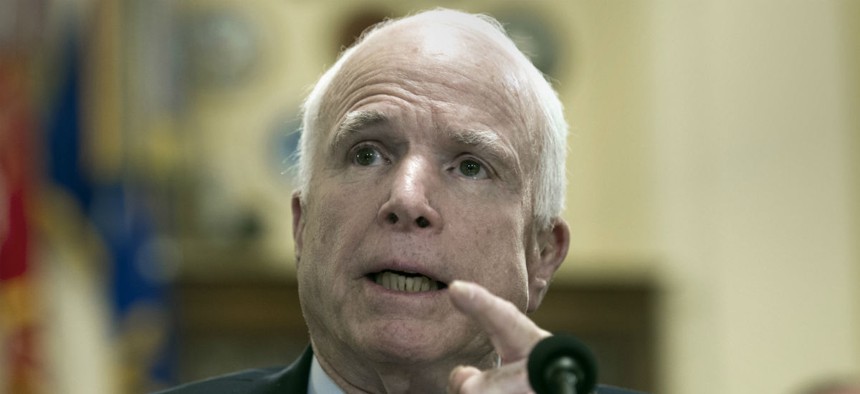Senators Push Reforms to Help Trump Achieve Promised Federal Hiring Surge
Lawmakers look to roll back 2010 law aimed at reducing corruption.
Sen. John McCain, R-Ariz., has quickly earned a reputation as one of President Trump’s harshest Republican critics, but he is still looking to help the new administration accomplish one of its signature policy goals.
McCain, along with Sens. Jeff Flake, R-Ariz., and Ron Johnson, R-Wis., who chairs the Senate Homeland Security and Governmental Affairs Committee, introduced the Boots on the Border Act to ease the hiring process at Customs and Border Protection. In a January executive order, Trump called on CBP to hire 5,500 new employees to strengthen border security. The president asked CBP to begin the hiring immediately, though it will likely take years and appropriations from Congress to fill the positions. The agency is drafting a hiring plan to ramp up its workforce.
That process could be made easier if the new Senate Republican bill is passed. The measure would attempt to loosen CBP’s strict hiring regulations by allowing certain groups of candidates to skip the polygraph section of the application process. Former federal employees who served in law enforcement for at least three years; had the authority to make arrests, conduct investigations and carry firearms; and previously passed background checks would qualify to skip the polygraph exam. Also authorized for polygraph exemption would be military personnel transitioning into civilian jobs. The military members would have to have served for at least four years. They would also need a recent security clearance and would have to have departed the armed services with an honorable discharge.
State and local law enforcement officers in good standing who took a polygraph as part of their initial application process would also be able to skip the federal lie detector test.
A 2016 DHS inspector general’s report found Homeland Security Department components face “significant delays” in hiring despite a 2014 funding infusion to boost the workforces of Immigration and Customs Enforcement, Border Patrol and the Secret Service. All of DHS has undergone cuts in human resources funding and money for new applicant-tracking software, the auditors said.
CBP told the IG it had difficulty creating hiring timeframes specifically due to the variability of polygraph examinations, with officials saying they can complete 5,000 reviews in one period and only 1,000 in the next. Kevin McAleenan, now the acting CBP commissioner, told a Senate committee last year that the agency had a shortage of qualified polygraphers to help with background checks and a high failure rate of applicants.
“Our standards are higher,” he said, adding too many candidates fail drug tests, or hesitate to relocate to remote assignments.
Congress required CBP to issue polygraphs for all law enforcement hires in the 2010 Anti-Border Corruption Act, which it passed after a rapid buildup of Border Patrol personnel under President George W. Bush led to widespread misconduct at the agency. Still, lawmakers said current vacancies -- BP is nearly 2,000 agents short of its congressionally mandated workforce floor -- are unsustainable. McCain said his legislation would “remove unnecessary obstacles” standing in the way of CBP hiring qualified applicants.
“We can’t effectively secure our southern border if we don’t have the manpower to get the job done,” McCain said. “This legislation would address CBP’s chronic staffing shortage by streamlining background tests for qualified veterans, military service members and law enforcement officers in good standing.”
The National Border Patrol Council, which represents BP employees, has cautioned against a “mad rush” to fill positions similar to the Bush administration’s approach. The union is generally supportive of Trump and his immigration and border security policies. Art Del Cueto, president of NBPC’s local in Tucson, Ariz., praised the Boots on the Border Act.
“I am pleased to see commonsense reforms to what has been a troubled approach to the department’s execution of the polygraph requirements,” Del Cueto said. “Measures like this place national security over needless bureaucratic hurdles.”
Not all of the potential pitfalls of Trump’s proposed hiring surge are likely to be addressed by the bill; Former BP directors have warned Trump’s policies would further back up an already logjammed system, and CBP has already trimmed the average hiring time from 18 months to 160 days. New hires will require computers, vehicles, guns and office space. In addition to new space and beds, the agencies will need a boost in transportation resources, such as buses, vans and airplane contracts. Support staff for new judges, agents and officers will likely include beefed up human resources and internal affairs.
In implementation guidance for Trump’s order, DHS Secretary John Kelly instructed CBP to hire additional mission support and legal personnel to assist the new staff and help with policy implementation.




